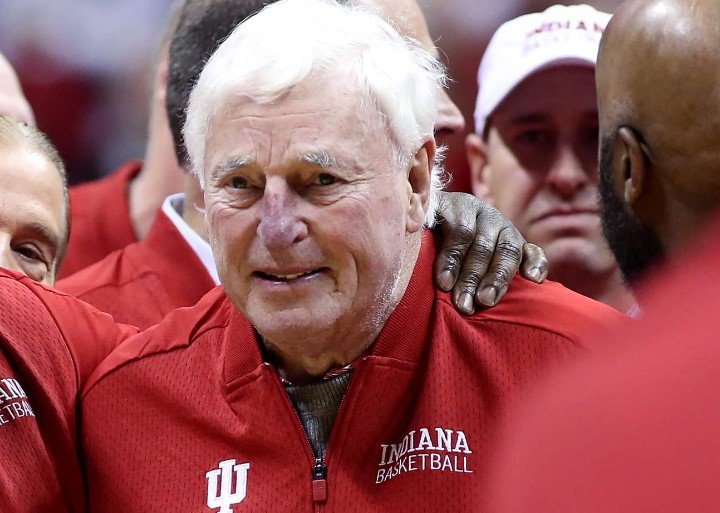Bob Knight, one of the most successful and controversial coaches in college basketball history, died on Wednesday at his home in Bloomington, Indiana. He was 83 years old. Knight’s family announced his death on his foundation’s website, saying he was “surrounded by family and friends”. Knight had been in poor health for several years and was hospitalized with an illness in April.

A Hall of Fame career with Indiana Hoosiers
Knight coached the Indiana Hoosiers for 29 seasons from 1971 to 2000, winning three national championships in 1976, 1981 and 1987. He also led the Hoosiers to five Final Four appearances, 11 Big Ten titles and a record of 662-239. He is the sixth-winningest coach in Division I men’s college basketball history with 902 wins, behind only Mike Krzyzewski, Jim Boeheim, Jim Calhoun, Roy Williams and Dean Smith.
Knight’s most remarkable achievement was guiding the Hoosiers to an undefeated season in 1975-76, the last time a Division I men’s team accomplished that feat. The Hoosiers went 32-0 and beat Michigan 86-68 in the national title game. The team featured future NBA stars Scott May, Quinn Buckner and Kent Benson.
Knight was known for his intense and demanding style of coaching, which often resulted in fiery confrontations with players, referees and media. He was also revered for his basketball acumen, his emphasis on defense and fundamentals, and his loyalty to his players and staff. He mentored many successful coaches, including Mike Krzyzewski, Steve Alford, Randy Wittman and Isiah Thomas.
A controversial figure who faced criticism and scandals
Knight’s career was also marred by several controversies and scandals that tarnished his reputation and eventually led to his dismissal from Indiana in 2000. He was accused of physically and verbally abusing players, throwing chairs on the court, head-butting a player, choking a player during practice, kicking his son during a game and assaulting a police officer in Puerto Rico.
Knight was also involved in a heated feud with Indiana University president Myles Brand, who imposed a zero-tolerance policy on Knight’s behavior after an investigation revealed that he had grabbed a student by the arm and berated him for addressing him as “Hey Knight”. In September 2000, Knight was fired after he violated the policy by grabbing a player by the neck during a practice session.
Knight later coached at Texas Tech from 2001 to 2008, where he won 138 games and reached the NCAA tournament four times. He retired in the middle of the 2007-08 season and handed over the reins to his son Pat. He also worked as a college basketball analyst for ESPN from 2008 to 2015.
A legend who left a lasting legacy on college basketball
Knight’s death sparked an outpouring of tributes and condolences from the basketball community, including former players, coaches, rivals and fans. Many praised him for his achievements, his passion and his impact on the game.
“Coach Knight was one of the greatest coaches of all time,” said Mike Krzyzewski, who played for Knight at Army and coached against him at Duke. “He taught me so much about the game and life. He was a mentor, a friend and a father figure to me. I will always be grateful for his guidance and support.”
“Coach Knight was a legend who changed my life forever,” said Isiah Thomas, who led Indiana to the 1981 national title and became an NBA Hall of Famer. “He taught me how to play basketball, how to compete, how to win and how to love. He was more than a coach to me. He was a father figure who cared for me and my family.”
“Coach Knight was a visionary who revolutionized college basketball,” said Steve Alford, who starred for Indiana in the 1987 national title team and became a successful coach at UCLA. “He was ahead of his time in terms of strategy, defense and player development. He inspired me to become a coach and taught me how to lead with integrity and excellence.”
Knight’s legacy will live on in the history books, in the hearts of his players and fans, and in the banners that hang from the rafters of Assembly Hall.






